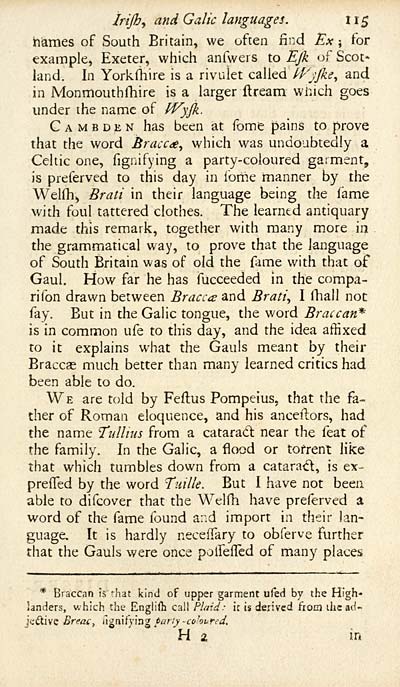Blair Collection > Critical dissertations on the origin, antiquities, language, government, manners, and religion, of the antient Caledonians, their posterity the Picts, and the British and Irish Scots
(153)
Download files
Complete book:
Individual page:
Thumbnail gallery: Grid view | List view

Irijhy and Galic languages. 115
hiames of South Britain, we often find Ex } for
example, Exeter, which anfwers to Ejk of Scot-
land. In Yorkiiiire is a rivulet called f-f^jjke^ and
in Monmouthfhire is a larger dream wnich goes
under the name of fVyJk.
C A M B D E N has been at fome pains to prove
that the word Bracc<£, which was undoubtedly a
Celtic one, fignifying a party-coloured garment,
is preferved to this day in fome manner by the
Welfh^ Brati in their language being the (ame
with foul tattered clothes. The learned antiquary
made this remark, together with many more in
the grammatical way, to prove that the language
of South Britain was of old the fame with that of
Gaul. How far he has fucceeded in the compa-
nion drawn between Bracas and Brati., I fhall not
fay. But in the Galic tongue, the word Brae can*
is in common ufe to this day, and the idea affixed
to it explains what the Gauls meant by their
Braccas much better than many learned critics had
been able to do.
We are told by Feftus Pompeius, that the fa-
ther of Roman eloquence, and his anceftors, had
the name Tidlnis from a catarad: near the feat of
the family. In the Galic, a flood or torrent like
that which tumbles down from a cataratfl, is ex-
prefled by the word Tiiille. But I have not been
able to difcover that the Welfh have preferved a
word of the fame found ar.d import in their lan-
guage. It is hardly neceffary to obferve further
that the Gauls were once polIeiTed of many places
* Braccan is 'hat kind of upper garment ufed by the High-
landers, v.'hich the Englifh call Plaid: it is derived fioci iliead-
jc(ftive BreaCy agxi\i'y\zig iariy -co'ovred.
H 2 in
hiames of South Britain, we often find Ex } for
example, Exeter, which anfwers to Ejk of Scot-
land. In Yorkiiiire is a rivulet called f-f^jjke^ and
in Monmouthfhire is a larger dream wnich goes
under the name of fVyJk.
C A M B D E N has been at fome pains to prove
that the word Bracc<£, which was undoubtedly a
Celtic one, fignifying a party-coloured garment,
is preferved to this day in fome manner by the
Welfh^ Brati in their language being the (ame
with foul tattered clothes. The learned antiquary
made this remark, together with many more in
the grammatical way, to prove that the language
of South Britain was of old the fame with that of
Gaul. How far he has fucceeded in the compa-
nion drawn between Bracas and Brati., I fhall not
fay. But in the Galic tongue, the word Brae can*
is in common ufe to this day, and the idea affixed
to it explains what the Gauls meant by their
Braccas much better than many learned critics had
been able to do.
We are told by Feftus Pompeius, that the fa-
ther of Roman eloquence, and his anceftors, had
the name Tidlnis from a catarad: near the feat of
the family. In the Galic, a flood or torrent like
that which tumbles down from a cataratfl, is ex-
prefled by the word Tiiille. But I have not been
able to difcover that the Welfh have preferved a
word of the fame found ar.d import in their lan-
guage. It is hardly neceffary to obferve further
that the Gauls were once polIeiTed of many places
* Braccan is 'hat kind of upper garment ufed by the High-
landers, v.'hich the Englifh call Plaid: it is derived fioci iliead-
jc(ftive BreaCy agxi\i'y\zig iariy -co'ovred.
H 2 in
Set display mode to: Large image | Transcription
Images and transcriptions on this page, including medium image downloads, may be used under the Creative Commons Attribution 4.0 International Licence unless otherwise stated. ![]()
| Permanent URL | https://digital.nls.uk/76288294 |
|---|
| Description | A selection of books from a collection of more than 500 titles, mostly on religious and literary topics. Also includes some material dealing with other Celtic languages and societies. Collection created towards the end of the 19th century by Lady Evelyn Stewart Murray. |
|---|
| Description | Selected items from five 'Special and Named Printed Collections'. Includes books in Gaelic and other Celtic languages, works about the Gaels, their languages, literature, culture and history. |
|---|

